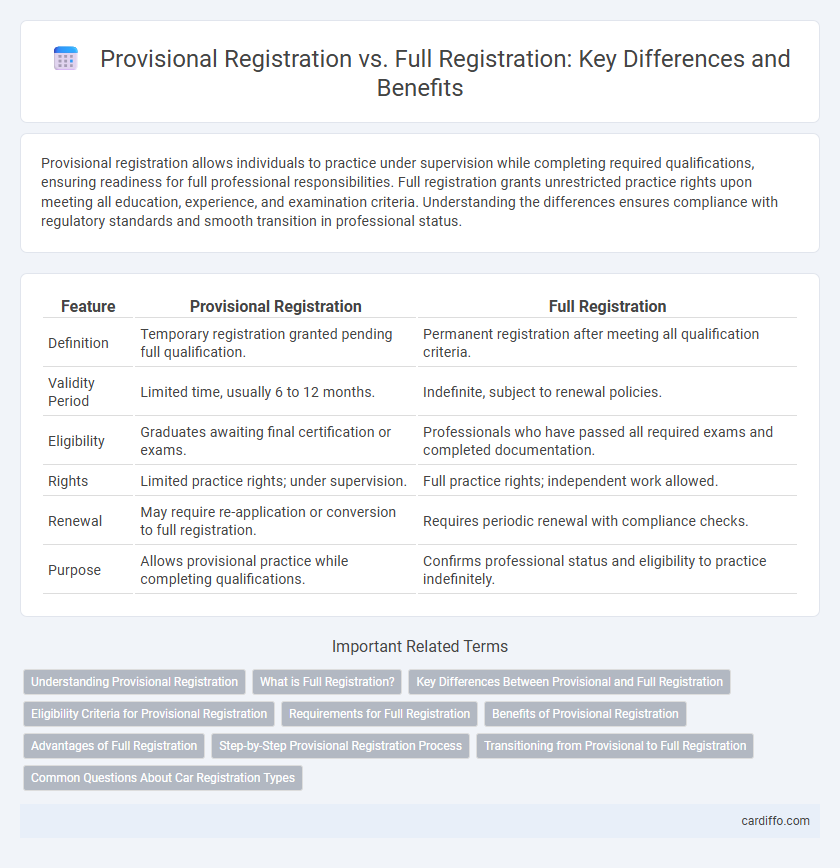Provisional registration allows individuals to practice under supervision while completing required qualifications, ensuring readiness for full professional responsibilities. Full registration grants unrestricted practice rights upon meeting all education, experience, and examination criteria. Understanding the differences ensures compliance with regulatory standards and smooth transition in professional status.
Table of Comparison
| Feature | Provisional Registration | Full Registration |
|---|---|---|
| Definition | Temporary registration granted pending full qualification. | Permanent registration after meeting all qualification criteria. |
| Validity Period | Limited time, usually 6 to 12 months. | Indefinite, subject to renewal policies. |
| Eligibility | Graduates awaiting final certification or exams. | Professionals who have passed all required exams and completed documentation. |
| Rights | Limited practice rights; under supervision. | Full practice rights; independent work allowed. |
| Renewal | May require re-application or conversion to full registration. | Requires periodic renewal with compliance checks. |
| Purpose | Allows provisional practice while completing qualifications. | Confirms professional status and eligibility to practice indefinitely. |
Understanding Provisional Registration
Provisional registration serves as a temporary status allowing individuals to practice or operate legally while completing mandatory requirements for full registration. It provides limited rights and is often subject to specific conditions, ensuring compliance with regulatory standards before granting full authorization. Understanding provisional registration helps clarify eligibility criteria, duration, and obligations necessary for transitioning to full registration.
What is Full Registration?
Full registration is the official authorization granted to professionals after meeting all regulatory requirements, including completion of education, training, and assessments. It allows individuals to practice without restrictions and often includes the ability to supervise others or take on advanced roles. Full registration ensures compliance with industry standards and legal obligations, enhancing trust and credibility in professional services.
Key Differences Between Provisional and Full Registration
Provisional registration allows individuals to practice under supervision while completing mandatory requirements, whereas full registration grants independent professional practice rights upon meeting all criteria. Key differences include the scope of practice, supervision level, and eligibility for professional benefits such as voting in regulatory decisions. Provisional registration is typically time-limited and contingent on successful completion of examinations or supervised practice hours required for full registration.
Eligibility Criteria for Provisional Registration
Provisional registration eligibility criteria typically require applicants to have successfully completed an accredited academic program and obtained relevant provisional qualifications. Candidates must also meet specific regulatory or board requirements, such as submitting proof of identity, academic transcripts, and sometimes passing preliminary examinations. This status allows graduates to practice under supervision while fulfilling conditions necessary for full registration.
Requirements for Full Registration
Full registration requires completion of all provisional registration obligations, including verified professional practice hours and successful passage of any standardized competency assessments. Applicants must also provide evidence of meeting continuing professional development criteria and submit comprehensive documentation verifying identity, qualifications, and good character. Meeting these rigorous requirements ensures eligibility for unrestricted practice and full professional recognition.
Benefits of Provisional Registration
Provisional registration offers immediate legal authorization to practice while fulfilling full registration requirements, enabling faster entry into the professional field. It provides access to supervised practice environments that enhance practical skills and professional development before attaining full registration. This stage also facilitates smoother transition through regulatory compliance, ensuring candidates meet competency standards efficiently.
Advantages of Full Registration
Full Registration offers legal recognition and access to a broader scope of professional opportunities, ensuring compliance with regulatory standards. It provides eligibility for permanent practice rights and enhances credibility with clients and employers. Holding Full Registration often leads to higher career advancement potential and increased earning capacity within the profession.
Step-by-Step Provisional Registration Process
The provisional registration process begins with submitting an application form along with identity proof and relevant qualifications to the designated authority. Applicants must undergo verification, including approval of documents and payment of applicable fees, before receiving a temporary registration certificate. This certificate allows limited practice until full registration is granted after meeting all professional and regulatory requirements.
Transitioning from Provisional to Full Registration
Transitioning from provisional registration to full registration involves meeting specific competency requirements and completing mandatory supervised practice hours as outlined by the regulatory authority. Applicants must submit evidence of their skills development, professional conduct, and any required assessments or exams to demonstrate readiness for independent practice. Upon successful evaluation, full registration grants practitioners unrestricted practice rights and professional recognition within their field.
Common Questions About Car Registration Types
Provisional registration allows new vehicle owners to operate their cars temporarily while completing all necessary documentation and inspections required for full registration. Full registration confirms that the vehicle meets all legal standards and is officially authorized for long-term use on public roads. Common questions include the duration of provisional registration, the documents needed for conversion to full registration, and the differences in fees and legal responsibilities between the two types.
Provisional Registration vs Full Registration Infographic

 cardiffo.com
cardiffo.com